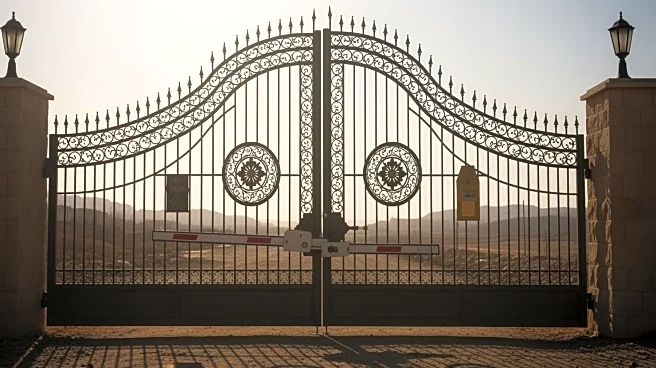What's Happening?
The Rafah border crossing between Gaza and Egypt is at the center of a dispute between Israel and Palestinian authorities. The Palestinian embassy in Egypt announced that the crossing would reopen on Monday
for people returning to Gaza. However, Israeli Prime Minister Benjamin Netanyahu's office contradicted this, stating that the crossing would remain closed until further notice, contingent on Hamas's cooperation in returning the bodies of hostages. The Rafah crossing, the only one not controlled by Israel before the war, has been closed since May 2024. Its reopening is crucial for Gazans seeking medical treatment, travel, or family visits in Egypt. Meanwhile, the ceasefire has allowed for the recovery of bodies in Gaza, with the Palestinian death toll surpassing 68,000. The ceasefire agreement also involves the return of hostages' remains, with Israel recently identifying the remains of Eliyahu Margalit, a 76-year-old abducted during the October 2023 attack.
Why It's Important?
The reopening of the Rafah crossing is significant for humanitarian reasons, as it would facilitate the movement of people and aid into Gaza, a region heavily impacted by the ongoing conflict. The disagreement over the crossing highlights the fragile nature of the ceasefire and the complex negotiations involved in the peace process. The situation affects not only the residents of Gaza but also international relations, as countries like Egypt play a mediating role. The humanitarian crisis in Gaza, exacerbated by the war and blockade, has drawn international attention, with calls for increased aid and reconstruction efforts. The outcome of these negotiations could influence future peace talks and the stability of the region.
What's Next?
The next steps involve continued negotiations between Israel, Hamas, and international mediators to resolve the dispute over the Rafah crossing. The ceasefire's success depends on the fulfillment of its terms, including the return of hostages' remains and the flow of humanitarian aid. Stakeholders, including the United Nations and humanitarian organizations, are likely to increase pressure on both parties to adhere to the ceasefire agreement. The international community will be watching closely, as any breakdown in the ceasefire could lead to renewed hostilities and further humanitarian crises.
Beyond the Headlines
The situation at the Rafah crossing underscores the broader geopolitical dynamics in the Middle East, where border control and access to resources are often contentious issues. The conflict has highlighted the humanitarian challenges faced by Gazans, including food insecurity and limited access to medical care. The ongoing negotiations and ceasefire efforts may set precedents for future conflict resolution strategies in the region. Additionally, the role of international mediators and aid organizations is crucial in maintaining peace and providing relief to affected populations.










